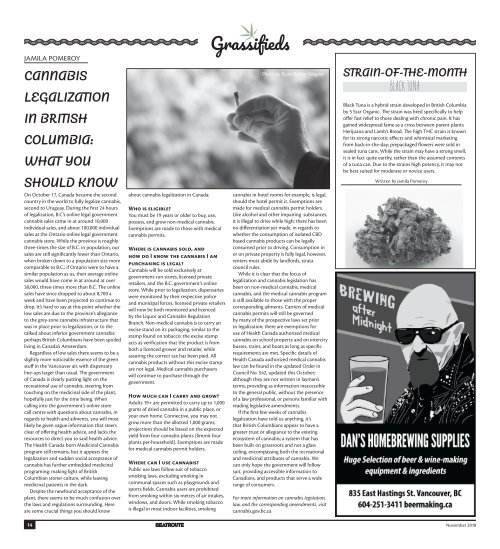BeatRoute Magazine BC Edition November 2018
BeatRoute Magazine is a monthly arts and entertainment paper with a predominant focus on music – local, independent or otherwise. The paper started in June 2004 and continues to provide a healthy dose of perversity while exercising rock ‘n’ roll ethics. Currently BeatRoute’s AB edition is distributed in Calgary, Edmonton (by S*A*R*G*E), Banff and Canmore. The BC edition is distributed in Vancouver, Victoria and Nanaimo. BeatRoute (AB) Mission PO 23045 Calgary, AB T2S 3A8 E. editor@beatroute.ca BeatRoute (BC) #202 – 2405 E Hastings Vancouver, BC V5K 1Y8 P. 778-888-1120
BeatRoute Magazine is a monthly arts and entertainment paper with a predominant focus on music – local, independent or otherwise. The paper started in June 2004 and continues to provide a healthy dose of perversity while exercising rock ‘n’ roll ethics.
Currently BeatRoute’s AB edition is distributed in Calgary, Edmonton (by S*A*R*G*E), Banff and Canmore. The BC edition is distributed in Vancouver, Victoria and Nanaimo. BeatRoute (AB) Mission PO 23045 Calgary, AB T2S 3A8 E. editor@beatroute.ca BeatRoute (BC) #202 – 2405 E Hastings Vancouver, BC V5K 1Y8 P. 778-888-1120
You also want an ePaper? Increase the reach of your titles
YUMPU automatically turns print PDFs into web optimized ePapers that Google loves.
JAMILA POMEROY<br />
Grassifieds<br />
CANNABIS<br />
LEGALIZATION<br />
IN BRITISH<br />
COLUMBIA:<br />
WHAT YOU<br />
SHOULD KNOW<br />
On October 17, Canada became the second<br />
country in the world to fully legalize cannabis,<br />
second to Uruguay. During the first 24 hours<br />
of legalization, B.C’s online legal government<br />
cannabis sales came in at around 10,000<br />
individual sales, and about 100,000 individual<br />
sales at the Ontario online legal government<br />
cannabis store. While the province is roughly<br />
three-times the size of B.C. in population, our<br />
sales are still significantly lower than Ontario,<br />
when broken down to a population size more<br />
comparable to B.C.; if Ontario were to have a<br />
similar population as us, their average online<br />
sales would have come in at around at over<br />
30,000, three-times more than B.C. The online<br />
sales have since dropped to about 8,700 a<br />
week and have been projected to continue to<br />
drop. It’s hard to say at this point whether the<br />
low sales are due to the province’s allegiance<br />
to the grey-zone cannabis infrastructure that<br />
was in place prior to legalization, or to the<br />
talked about inferior government cannabis:<br />
perhaps British Columbians have been spoiled<br />
living in Canada’s Amsterdam.<br />
Regardless of low sales there seems to be a<br />
slightly more noticeable essence of the green<br />
stuff in the Vancouver air, with dispensary<br />
line-ups larger than usual. The government<br />
of Canada is clearly putting light on the<br />
recreational use of cannabis, steering from<br />
touching on the medicinal side of the plant,<br />
hopefully just for the time being. When<br />
calling into the government’s online store<br />
call centre with questions about cannabis, in<br />
regards to health and ailments, you will most<br />
likely be given vague information that steers<br />
clear of offering health advice, and lacks the<br />
resources to direct you to said health advice.<br />
The Health Canada born Medicinal Cannabis<br />
program still remains, but it appears the<br />
legalization and sudden social acceptance of<br />
cannabis has further embedded medicinal<br />
programing: making light of British<br />
Columbian stoner culture, while leaving<br />
medicinal patients in the dark.<br />
Despite the newfound acceptance of the<br />
plant, there seems to be much confusion over<br />
the laws and regulations surrounding. Here<br />
are some crucial things you should know<br />
about cannabis legalization in Canada:<br />
Who is eligible?<br />
You must be 19 years or older to buy, use,<br />
possess, and grow non-medical cannabis.<br />
Exemptions are made to those with medical<br />
cannabis permits.<br />
Where is cannabis sold, and<br />
how do I know the cannabis I am<br />
purchasing is legal?<br />
Cannabis will be sold exclusively at<br />
government-run stores, licensed private<br />
retailers, and the B.C. government’s online<br />
store. While prior to legalization, dispensaries<br />
were monitored by their respective police<br />
and municipal forces, licensed private retailers<br />
will now be both monitored and licenced<br />
by the Liquor and Cannabis Regulation<br />
Branch. Non-medical cannabis is to carry an<br />
excise stand on its packaging, similar to the<br />
stamp found on tobacco: the excise stamp<br />
acts as verification that the product is from<br />
both a licenced grower and retailer, while<br />
assuring the correct tax has been paid. All<br />
cannabis products without this excise stamp<br />
are not legal. Medical cannabis purchasers<br />
will continue to purchase through the<br />
government.<br />
How much can I carry and grow?<br />
Adults 19+ are permitted to carry up to 1,000<br />
grams of dried cannabis in a public place, or<br />
your own home. Connective, you may not<br />
grow more than the allotted 1,000 grams;<br />
projections should be based on the expected<br />
yield from four cannabis plants (limmit four<br />
plants per-household). Exemptions are made<br />
for medical cannabis permit holders.<br />
Where can I use cannabis?<br />
Public use laws follow suit of tobacco<br />
smoking laws, excluding smoking in<br />
communal spaces such as playgrounds and<br />
sports fields. Cannabis users are prohibited<br />
from smoking within six metres of air intakes,<br />
windows, and doors. While smoking tobacco<br />
is illegal in most indoor facilities, smoking<br />
Photo by Ryan Walter Wagner<br />
cannabis in hotel rooms for example, is legal,<br />
should the hotel permit it. Exemptions are<br />
made for medical cannabis permit holders.<br />
Like alcohol and other impairing substances,<br />
it is illegal to drive while high; there has been<br />
no differentiation yet made, in regards to<br />
whether the consumption of isolated CBD<br />
based cannabis products can be legally<br />
consumed prior to driving. Consumption in<br />
or on private property is fully legal, however,<br />
renters must abide by landlords, strata<br />
council rules.<br />
While it is clear that the focus of<br />
legalization and cannabis legislation has<br />
been on non-medical cannabis, medical<br />
cannabis, and the medical cannabis program<br />
is still available to those with the proper<br />
corresponding ailments. Carriers of medical<br />
cannabis permits will still be governed<br />
by many of the prospective laws set prior<br />
to legalization; there are exemptions for<br />
use of Health Canada authorized medical<br />
cannabis on school property and on intercity<br />
busses, trains, and boats as long as specific<br />
requirements are met. Specific details of<br />
Health Canada authorized medical cannabis<br />
law can be found in the updated Order in<br />
Council No. 542, updated this October;<br />
although they are not written in layman’s<br />
terms, providing as information inaccessible<br />
to the general public, without the presence<br />
of a law professional, or persons familiar with<br />
reading legislative amendments.<br />
If the first few weeks of cannabis<br />
legalization have told us anything, it’s<br />
that British Columbians appear to have a<br />
greater trust or allegiance to the existing<br />
ecosystem of cannabis; a system that has<br />
been built on grassroots and not a glass<br />
ceiling, encompassing both the recreational<br />
and medicinal attributes of cannabis. We<br />
can only hope the government will follow<br />
suit, providing accessible information to<br />
Canadians, and products that serve a wide<br />
range of consumers.<br />
For more information on cannabis legislation,<br />
law, and the corresponding amendments, visit<br />
cannabis.gov.bc.ca<br />
STRAIN-OF-THE-MONTH<br />
Black Tuna<br />
Black Tuna is a hybrid strain developed in British Columbia<br />
by 5 Star Organic. The strain was bred specifically to help<br />
offer fast relief to those dealing with chronic pain. It has<br />
gained widespread fame as a cross between parent plants<br />
Herijuana and Lamb’s Bread. The high THC strain is known<br />
for its strong narcotic effects and whimsical marketing<br />
from back-in-the-day; prepackaged flowers were sold in<br />
sealed tuna cans. While the strain may have a strong smell,<br />
it is in fact quite earthy, rather than the assumed contents<br />
of a tuna can. Due to the strains high potency, it may not<br />
be best suited for moderate or novice users.<br />
Written by Jamila Pomeroy<br />
14<br />
<strong>November</strong> <strong>2018</strong>


















